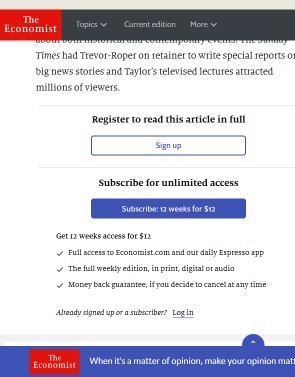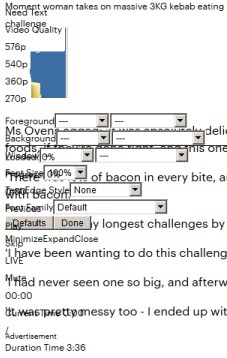 fter thinking about this for a good twenty minutes, I've come up with some new ideas
about how websites can keep themselves afloat without inciting their readers' wrath.
And let me assure you that this article is pure clickbait. But too late, you clicked
already.
fter thinking about this for a good twenty minutes, I've come up with some new ideas
about how websites can keep themselves afloat without inciting their readers' wrath.
And let me assure you that this article is pure clickbait. But too late, you clicked
already.
I mean, let's face it: even if you're the best writer in the world, there are some cheapskates out there who are just never going to pay voluntarily to read your stuff. But there are ways you can trick them into sending you money anyway.

Paywalled Website (resized and cropped)
The way you're doing it now—by putting up paywalls to block part of all of your fabulous articles—won't work. All it will do is push people back to the mainstream media (which is probably the real goal: come on, you don't really think this mysterious shortage of ad revenue happened all by itself, do you?).
The same thing is happening to TV viewers. Now that there's a market for streaming services, all the content providers are starting their own proprietary ones and their prices are soaring. The Babylon Bee has a humorous article making fun of how that will play out:
"No longer do people have to pay upwards of $150 per month for a collection of channels," wrote one tech expert in Polygon. "Now you can subscribe to a bunch of different channels separately for like $300 a month. It's much more efficient."
But you have to pay your writers, at least until they can be replaced by artificial feed-forward Bayesian neural networks. Here's how.
Temporary embargo Medical journals were charging hundreds or even thousands of dollars for a subscription. So people in poor countries were dying because their doctors couldn't afford to read the articles. Solution: embargo the articles for a year, then make them free. Users of academic libraries loved it because it was so much faster than interlibrary loan. And people in poor countries learned to hang on for an extra year.
Of course, it needn't be a year. If you're serving news or interesting opinion, people will pay to get it a day earlier. And you never know, the ones who just say ‘meh’ might get a job someday.
- A consortium Few people are going to write a hundred checks just in case one writer says something intelligent. And even fewer trust Paypal to handle a hundred payments correctly. But I bet they'll gladly pay a single fee that supports all the left-wing (or right-wing) sites. Brendan Eich, who's pushing micropayments on his Brave browser, thinks so too.
- Floating embargo Put stories behind a paywall only on random days. This forces the reader to check back every day to see if the article they want to read is now available. When they realize their insurance doesn't cover carpal tunnel syndrome, they'll pay up.
-
Bad HTML paywall Here's where you have no actual paywall, but the articles are covered up with stray spin boxes and JavaScript error messages. Or they're at an inconvenient place, like way way way off to the right. The viewer will pay for tech support to help finding them on the page. Some websites are testing that strategy already. On one site I discovered hidden articles way off the left of the frame purely by accident when I resized my browser window (examples: dailymail.co.uk;

Can't read the article? Call Tech Support now! Only ten bucks a call plus 50 cents a minute! (Story about a girl eating a three-foot-long hot dog. Cropped and resized)pjmedia.com in FirefoxMay 2020, finally fixed!). - Okay, there aren't really seven ways. My press agent just said it had to say seven or they wouldn't click.
Here are some things you might want to avoid doing.
- Complain about the user's ad blocker, then when they add you to their whitelist, blast 'em with full-screen animated crap that blocks the content anyway. Then, while they're enjoying that, get 'em fired from their job by blasting some hyper-sounding reporter's voice out of their speakers. Problem solved! (Example: foxnews.com).
- Put up a dialog box asking for ridiculously fine-grained permissions. And keep putting it up every time until they tell you whether they want to allow information storage and access, personalisation, ad selection, delivery, reporting, measurement, Emerse Sverige AB, AdMaxim Inc, and many other things. That's a hint that you've found an even better way of monetizing them. The bastards will find out what it is soon enough (theguardian.co.uk).
- Of course, no paywall will save you if all your content is in underlined bold Courier font, and all your headlines are clickbait or outrage bait. Especially if you suddenly switch sides. Conservatives know the site I'm talking about.
- Employ writers who viciously insult anyone who disagrees with them and then send them spam hoping they'll still subscribe. (All websites that start with an N)
- Set dozens of cookies. Remember, the user may be as fat as Santa Claus, but he's not him. Oh, and check your page rendering only in Chrome. That's the American way: just as in politics, the majority defines what good code is. The rest can FO.
- And the most important thing: animated ads. Viewers love those. The faster they blink the more they like them. I'm not lying, honest. There's a survey somewhere that proves it.
Now, I have no idea if any of these ideas will actually work. But you knew that. I even told you up front this was clickbait. What, you thought I was kidding?
Kidding aside, paywalls change how people interact with the Internet. If people are forced to subscribe, they'll pick one big site, like www.economist.com, washingtonpost.com, or wsj.com to become their sole news source.
Maybe that's the goal. Putting your content behind a paywall might increase your revenues, at least for a time, but it also deprives your site of any chance to influence the public dialogue. In the long run, it's equivalent to going off line. Some big sites like New Scientist and the UK Telegraph may survive, but at the cost of disappearing from public view.
If these geniuses wanted to make money, they'd make sure their website is readable when the reader takes their ad-blocker down. They only get one chance. The fact that they don't care proves my theory that their business model is to short their own stock.
First AM radio, then FM, then television, then newspapers, then Usenet, then social media, and now Internet websites: all taken over by advertising, trash, and politics. It's another example of the Principle of Increasing Uselessness: every communications medium becomes increasingly clogged up with junk until it becomes useless and must be replaced with something else.
nov 15 2019, 4:18 am. last edited dec 05 2019, 5:44 am
